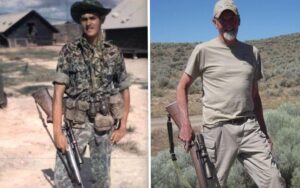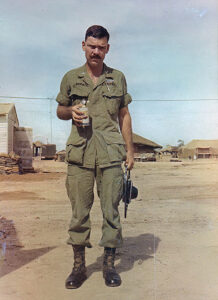I don’t see anything wrong with giving veterans preference.
Few members of Congress get as sweeping a view of veterans issues as Jeff Miller saw during six years as chairman of the House Veterans Affairs Committee. Miller became chairman of the committee in January 2011 and served in that position until he retired from Congress when his eighth term representing Florida’s 1st Congressional District expired in January 2017.
The Republican was first elected to Congress after winning a special election to finish the term of Joe Scarborough, who resigned after deciding he didn’t want to be in Congress anymore (and became an MSNBC host in April 2003). Miller’s district includes Pensacola Naval Air Station and Eglin Air Force Base. It also has one of the country’s largest populations of veterans.
On Nov.16, surrounded by packed and soon-to-be-packed papers, pictures and other mementos in his Capitol Hill office, Miller reflected on an array of veterans’ concerns with Vietnam magazine Editor Chuck Springston.
What do you see as the strengths and weaknesses of the Department of Veterans Affairs? Once veterans get into the system and get their health care, most of them are satisfied. Polytrauma, spinal cord injuries and traumatic brain injuries are things the VA is very good at. Still, there are limitations in access to care. That’s why the Choice program is so important. [The Choice program, created in a 2014 law, enables veterans to go outside the VA system and use private health care professionals when treatment at a government facility means long wait times or travel burdens.]
Without a doubt the National Cemetery Administration is the gold standard in this country. They do a magnificent job of placing veterans in their final resting place. And when issues have arisen, they’ve taken immediate ownership, admitted there was an error and corrected it.
The bureaucracy, though, is what pulls the department down. And that’s unfortunate because there are hundreds of thousands of employees in the VA who are outstanding representatives of the federal government. They are there doing the things that we as taxpayers would expect them to do for our American heroes.
Where does the Choice program stand? When we negotiated it two years ago, Sen. [Bernie] Sanders wanted a sunset date, which is August of 2017. I believe the program will be continued, but that has to be done legislatively.
What do you think is the appropriate mix of public and private health care options for veterans? There has to be a combination of public and private care. The VA cannot be in every community in this country with a sticks-and-bricks facility. The VA tries to treat all veterans across the country with 167 medical centers. It makes more sense in the 21st century, when a lot of care is done in an outpatient fashion, to have a blend of choices. The VA needs to let other people do things that they do well, and the VA should focus on those things that only the VA does well.
The VA has faced lawsuits and other challenges over eligibility for disability benefits concerning exposure to the poisonous Agent Orange sprayed over South Vietnam. The complainants have included sailors on ships anchored offshore who have been unsuccessful in getting benefits and postwar airmen flying in planes used in wartime spraying who have been successful in getting benefits. What are your thoughts on those controversies? The science is still not settled on many of those issues. But it is something that needs to be focused on with a very specific light because we do have clusters of illnesses that are unexplained, except for the fact that they were exposed to Agent Orange. I think the Navy issue needs to be resolved. The Navy folks have a bill [for consideration in Congress]. One of the main reasons the bill is not moving now is a price tag associated it with it of over a billion dollars, in addition to the fact that many say the science is not definite.
Another health issue facing many Vietnam veterans, though not limited to them, is post-traumatic stress. What should be done to assist them? As Vietnam veterans age, they find themselves expressing more and more post-traumatic stress symptoms. I think it’s important for all veterans to understand that it doesn’t matter if the onset comes 50 years after combat. As more people seek treatment, our health care providers will be able to better understand the triggers and treatments.
The one thing that concerns me is that veterans who get a disability rating and start receiving a disability payment are not required to get treatment [for post-traumatic stress]. It’s important to, No. 1, compensate veterans financially for the disability, but also we need to find ways to help them to deal with this disorder.
A related issue is the comparatively high rate of suicides among veterans. How should that be addressed? Statistics show that veterans who seek treatment in the VA are less apt to take their own lives. Their battle buddies and veterans service organizations are also perfect vehicles to reach out to these individuals.
And I think it’s incumbent upon everybody to listen as veterans are possibly crying out in ways you would not expect and urge them to seek help. Pastors and rabbis are crucial, I think, in getting people to understand that seeking help is the right thing to do and it doesn’t make you a lesser person because you sought help.
Homelessness among veterans, although reduced in recent years, is still a concern. What is the VA doing on that front? The VA spends about $1.6 billion a year on homelessness. A lot of the money is used for putting roofs over people’s heads. There is also an education component. But bending the curve downward involves much more than just putting a roof over somebody’s head. It is an entire regimen of diagnosis, of treatment, of education and trying to get people back on their feet.
The thing that really concerns me is that some of the homeless won’t or can’t break an addiction to drugs or alcohol. Most homeless shelters require you not to drink, not to do drugs, and that’s difficult for some.
I have worked with Bobby Shriver [a former mayor of Santa Monica, California, and nephew of John F. Kennedy] and a group in West LA to build a village for homeless veterans on the campus of the VA medical center there, next to UCLA. It is VA property, but a private concern will build the housing units, which will be near the medical center, a nursing home, all of the things you need from a health care perspective. We finally have passed authorization language allowing the VA to do it, and I’m very anxious for them to begin.
The federal government has instituted hiring preferences for veterans, but some critics say those laws shut out opportunities for qualified nonveterans. Do they have a point? The law basically says if both individuals are equally qualified and you’re a veteran, you get preference. I don’t see anything wrong with giving veterans preference. It is so critical to keeping veteran unemployment numbers as low as possible. And the part of the solution to homelessness is more than just a roof over your head—it is a stable employment opportunity.
You’ve worked not only with Vietnam veterans but also veterans of other conflicts, including the Iraq and Afghanistan wars. Do you see anything that distinguishes the veterans of one generation from those of another? Unfortunately, the thing that distinguishes Vietnam veterans from most other veteran populations is the fact that they still have a deep hurt in their hearts for the way they were treated when they returned home. We the American people must never allow that again. They did the job they were told to do.
What do you think are the lessons of the Vietnam War? The lesson of the Vietnam War is we should never tie the hands of those who are in combat so they can’t do what’s necessary to win. I firmly believe history now shows that those who were fighting the war were not allowed to win. And that is a shame.
Education: University of Florida, bachelor’s degree in journalism, 1984
Business: Real estate broker
Government: Gilchrist County sheriff’s deputy, 1980-81; executive assistant to Florida Agriculture Commissioner Doyle Connor, 1984-88; Florida House of Representatives, 1998-2001; U.S. House of Representatives, Florida’s 1st Congressional District (Pensacola), 2001-17
Published in Vietnam Magazine’s June 2017 issue.





